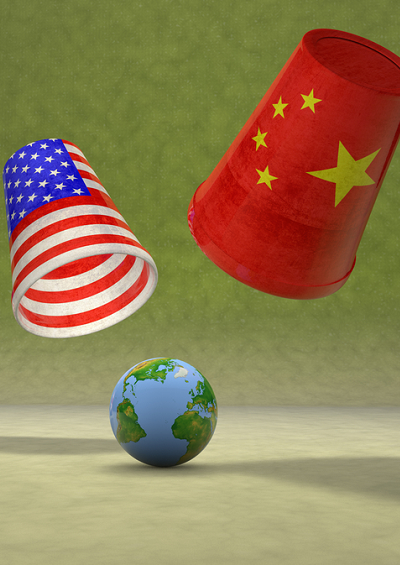How Donald Trump Is Losing the Trade War
Imitation is the highest form of flattery. Trump is not so much fighting China on trade as turning the U.S. into China.
May 31, 2019

The trade clash between the United States and China is not just about trade. It’s about whether China will remain a manufacturing appendix to the West or will get to rival — and perhaps eventually supplant — the United States as the leading global power.
After World War II, the United States and its Western allies created an international political and economic system to which other nations around the world gradually signed up.
The principles on which that system is based are similar to the ones on which the United States itself was established by the country’s Founding Fathers in the second half of the 18th century.
In this respect, the system certainly serves the interests of the United States and benefits it both politically and economically. However, it also allows other players to prosper. It creates a global marketplace that is not a zero-sum game, i.e., it is not about the division of the existing pie but about growing it in size, so that every player gets more.
The current global system is characterized by open borders, both to trade and to the movement of people. It is rules-based and relies on international institutions, but it is highly decentralized and oriented primarily on private-sector actors.
It is a system that encourages — and in many cases demands — democratic reforms and insists on the protection of human rights in countries around the globe. It maintains international peace by refusing to recognize occupation of countries and annexation of territory. It rejects the principle of altering national borders by force.
China works differently
China clearly works differently. It is state-centered and nationalistic. It defers to a leader, not institutions or laws. It is secretive, riddled with censorship and prizes the collective, not the individual citizen.
China occupies Tibet, deals harshly with its restive Uighur population and jails dissidents. It brooks no interference in its internal affairs — and is only too glad to close its eyes to other authoritarians doing the same thing in their corners of the globe.
China may or may not become a dominant power and put its imprint on the global system. But what is truly disconcerting is that Donald Trump is moving the United States away from its historic roots and principles. In the 2.5 years of his presidency, the United States is now much closer to the Chinese model.
Trump’s “America First” slogan is quintessentially how Beijing operates: It always puts China First. This is true even if China, in sharp contrast to Trump, usually tries to employ softer rhetoric.
Trump’s race to the Chinese bottom
Trump’s disregard for rules and laws at home and abroad is un-American but quite in line what the Chinese do when “reasons of state” demand so. The Chinese routinely spy on their competitors and steal their intellectual property and trade secrets.
Trump’s exit from the Iran nuclear deal and the Trans-Pacific Partnership were unilateral steps, affirming a form of absolutist national sovereignty that China proclaims as well. He wants to censor the media and subjugate the judiciary. He demands adoration and deference from his followers the way the Chinese used to adore Mao and other leaders.
Trump’s rallies gather large audiences who respond to him as a mob, not as rugged individualists Americans they still somehow believe they are.
In international relations, Trump’s America is already acting like China. Trump has recognized Israel’s annexation of the Golan Heights — making it the first time that territorial expansionism has gotten an imprimatur from Washington since the end of World War II.
Trump is also clearly itching to recognize Russia’s annexation of Crimea and give Putin a free hand in Ukraine.
Why China will lead the world
Meanwhile, China has not stood still. It has moved forward by adopting some of the best American virtues — such as pragmatism. To begin with, it abandoned dogmatic Marxism in favor of capitalist development and continued to pay only lip service to communism.
And, unlike ideologues in the United States who deny that climate change even exists, China believes scientists when they declare man-made global warming to be an existential threat to the planet and the world’s greatest challenge in coming decades.
While Trump promotes coal and attacks renewable energy, China has emerged as a leader in electric vehicle technology and solar power (while at the same time building plenty of new coal power plants, thank you).
Conclusion
With the United States abandoning its proudest and most productive principles and Trump racing to reach down to the Chinese bottom, it is clear that China, not the United States, is gearing up to lead the world in the 21st century.
Takeaways
Trump is not so much fighting China on trade as turning the US into China.
Trump’s “America First” slogan is quintessentially how Beijing operates: It always puts China First.
Trump’s unilateral steps affirm a form of absolutist national sovereignty that China proclaims as well.
China, not the US, is gearing up to lead the world in the 21st century.

